Experts Take on Race, Equality and Citizenship in All-Day Symposium
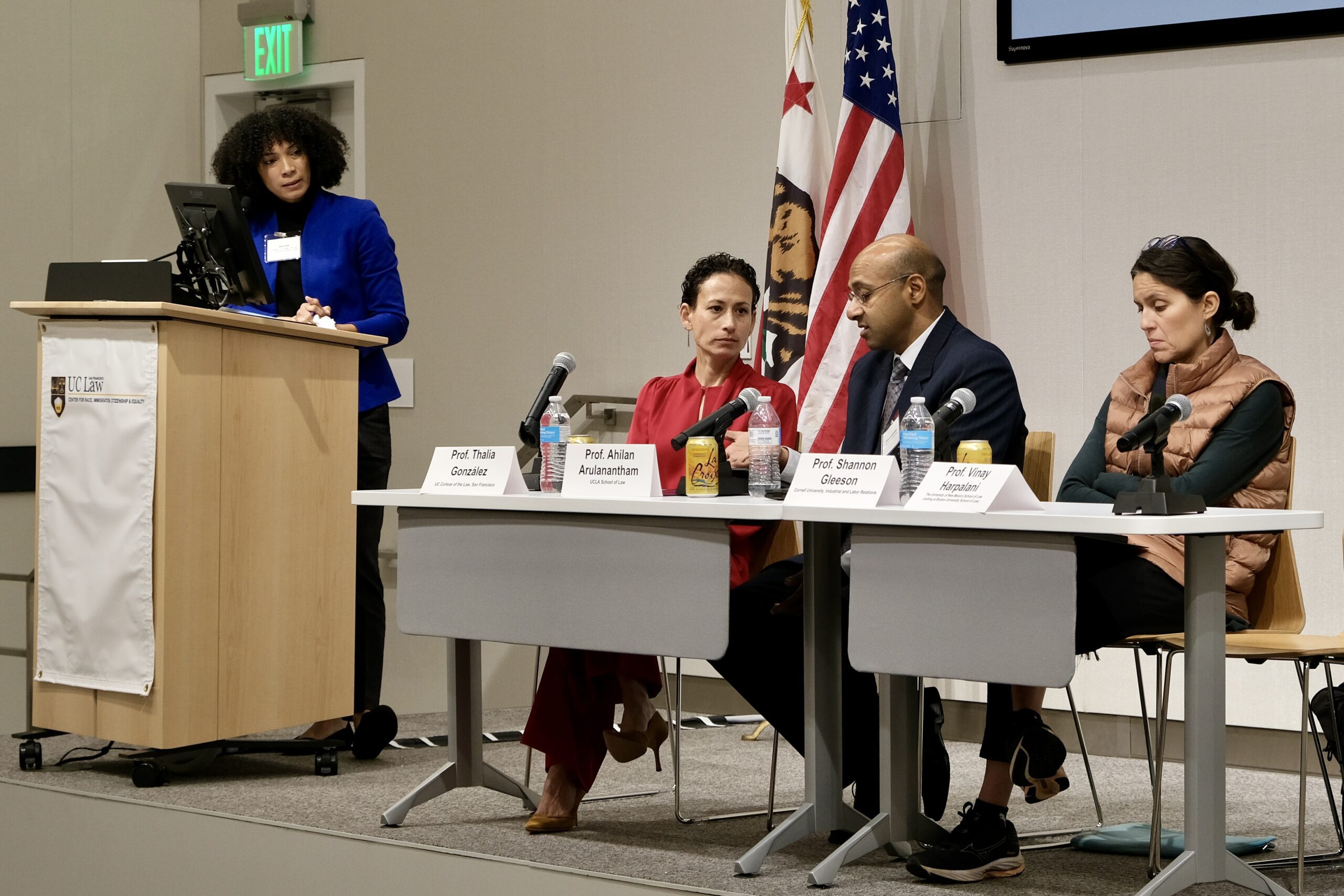
Professor Alina Ball, co-director of the Center for Racial and Economic Justice (CREJ) at UC Law SF, moderated a panel on “Limits on Citizenship from Schools to the Workplace” with fellow CREJ Co-Director and UC Law SF Professor Thalia González, UCLA Law Professor Ahilan Arulanantham, and Shannon Gleeson, professor of industrial and labor relations at Cornell University.
The following story was written by UC Law SF 3L student and RICE Research Fellow Miquela Kallenberger.
Reparations for past racial harms, barriers to making opportunity equal for all, and harmful depictions of racial minorities as threatening or dangerous were just a few topics discussed at an all-day symposium hosted by the UC Law Journal and Center for Race, Immigration, Citizenship, and Equality (RICE).
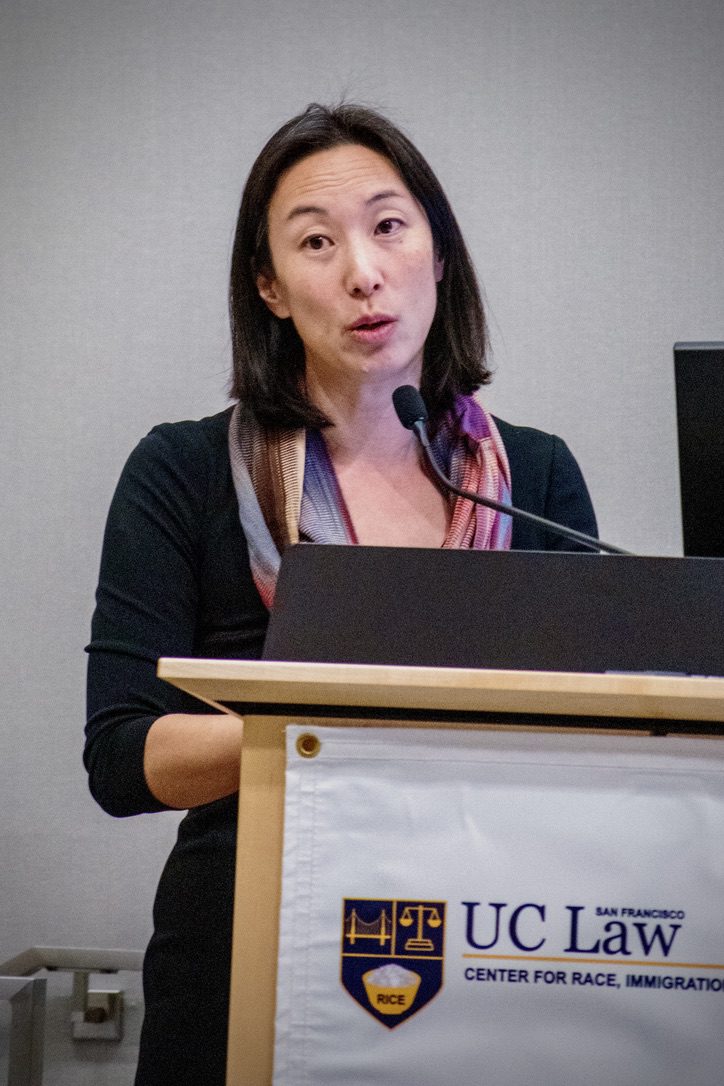
Professor Ming Hsu Chen is faculty director of the Center for Race, Immigration, Citizenship and Equality (RICE) at UC Law SF.
The Spring 2024 Symposium, titled “We the People: Citizenship, Race, and Equality,” featured sessions on the challenges of boosting diversity in political representation and civic engagement; the unjust portrayal of racial minorities as crime and national security threats; and lingering inequalities in schools and employment, despite civil rights victories in recent decades.
This year marks the 75th anniversary of the UC Law Journal and the first time it has collaborated with RICE, a center at UC Law SF that was established in Fall 2022. The symposium also celebrated the journal’s new name since changing from the Hastings Law Journal.
RICE Faculty Director Ming Hsu Chen and UC Law Journal Symposium Editor Safina Motiwala ’24 opened the Feb. 2 symposium with welcoming remarks.
“The idea for this conference flows from my research about the enduring quest of immigrants and people of color to attain a more equal citizenship,” Chen said. “Since publishing Pursuing Citizenship in the Enforcement Era, I’ve been wrestling with the structural limits on formal citizenship, and perhaps most important of all of those limits is racial inequality.”
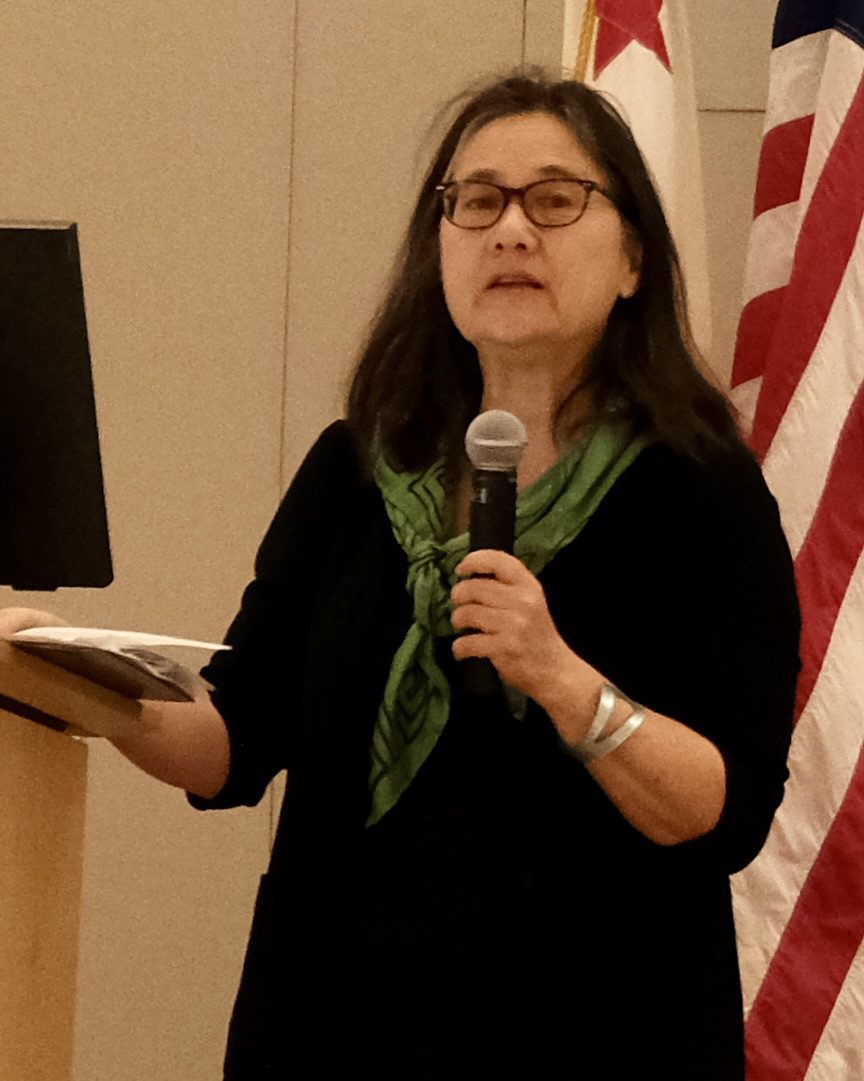
UC Berkeley Law Professor Leti Volpp is a scholar of immigration law and citizenship theory.
The invited speakers were renowned scholars, practitioners, and policymakers from California and around the country. Professors came from UC Berkeley School of Law, UC Davis School of Law, Stanford Law School, University of New Mexico School of Law, DePaul University College of Law, UCLA, and Cornell University among others. UC Law SF Professors Alina Ball, Richard Boswell, Thalia González, and Karen Musalo also served as moderators and panelists in the symposium’s sessions.
Keynote speaker Leti Volpp from the UC Berkeley School of Law framed the daylong discussion as delving into the “Janus-faced,” or contradictory, nature of citizenship.
“On the left-hand side is the theoretical promise that citizenship might guarantee the universalistic inclusion of everyone, while on the other, ‘We the People’ is a promise unfulfilled and, in particular, race threatens the equality associated with the idea of citizenship,” Volpp said.
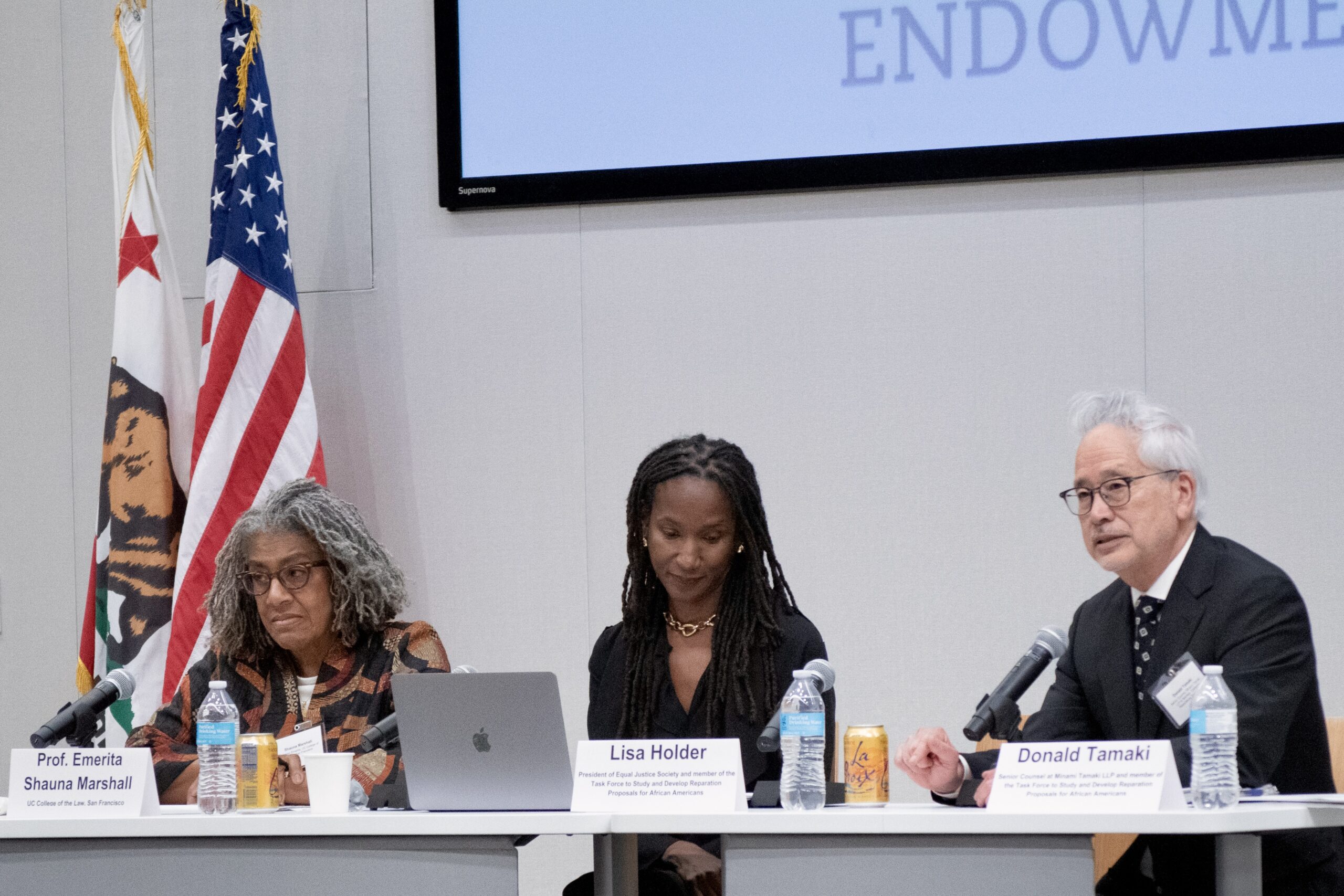
CREJ Co-Director Shauna Marshall led a panel talk with Lisa Holder and Donald Takami of California’s Reparations Task Force.
Shauna Marshall, co-director of the Center for Racial and Economic Justice at UC Law SF, moderated a session on the push for reparations as a remedy for racial injustice. She introduced Don Tamaki and Lisa Holder, members of California’s Task Force to Study and Develop Reparation Proposals for African Americans. Marshall reflected on Tamaki’s role in fighting for government reparations for World War II-era Japanese internment. Tamaki was part of the legal team that helped overturn civil rights icon Fred Korematsu’s conviction for resisting wartime internment. She also noted the ways that Brown v. Board of Education, which outlawed racial segregation in schools, stopped short of ending anti-Blackness in government institutions from housing to health to education.
“If we don’t adequately and appropriately address our history, we are never going to address our wrongs,” Marshall said.
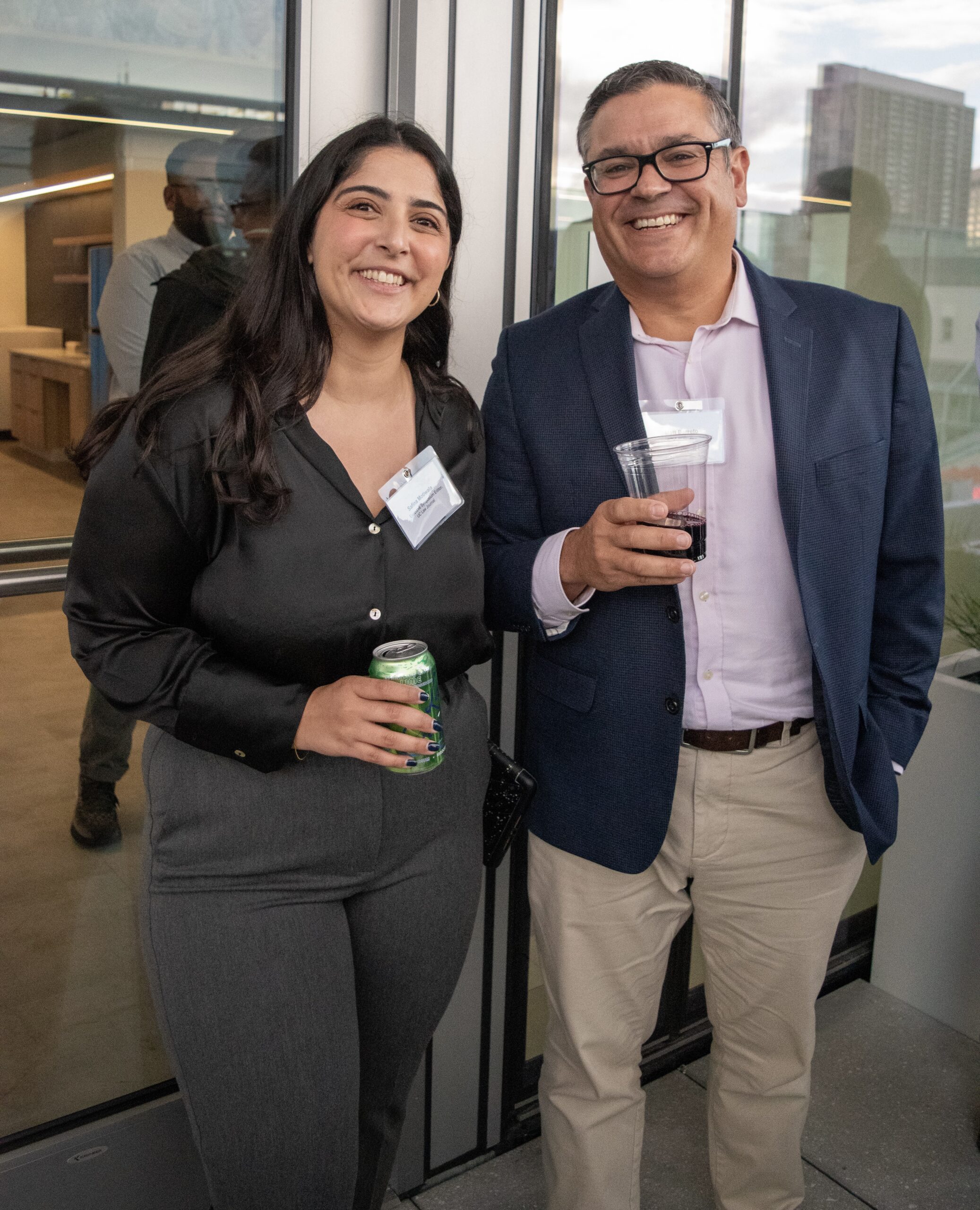
UC Law Journal Symposium Editor Safina Motiwala ’24 posed with Matt Barreto, professor of political science and Chicana/o Studies at UCLA.
Tamaki and Holder sought support for the task force’s report detailing the history of anti-Black racist government policies. The report listed 115 recommendations for California to remedy past wrongs. Noting that more than 470 diverse public-interest organizations endorsed the report, they encouraged the audience to find ways “to walk forward together.” They also insisted that California need not wait for the federal government to make amends for racial injustice.
The symposium ended with a celebration on the seventh-floor sky lounge of UC Law SF’s new 198 McAllister St. building, where students and scholars mingled and reflected on what they learned.
Motiwala, the symposium editor, described the symposium’s topics as a “fluid story of noncitizens in this country from the past, present, and future, backed by empirical data.” She added that the symposium event is only one step in a larger program: “Essays published by the speakers will appear in the UC Law Journal’s special issue in summer 2024, and the calls to action that follow will be the lasting impact of this symposium.”